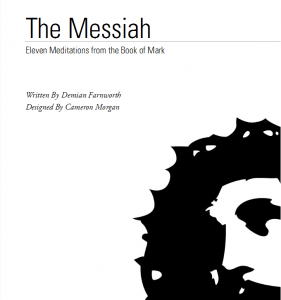Long time ago there was a small boy who was brought in from one of the villages in the dark forest that surrounded the castle to live in the kingdom covered in sunlight.
Upon arriving he discovered that he was loved by the king, but the boy never met the king, and never learned why he was loved by the king. But he did meet many of the king’s servants.
He was educated by the scholar, fed by the scullery maid. On occasion a lawyer who represented the king would come along to promise him that one day he would meet the king.
The boy enjoyed the pleasures of the castle: the library, the jousting, the feasts. But there were also pains.
The king’s children abused the boy. They took his blankets while he slept, lynched him in the dark and spread rumors about the boy. In these dark moments, looking out his castle window, the boy would wonder the difference between his new life in the castle and his old life in the dark village. Was there a difference? And where was this king?
One day a lawyer appeared and reminded him that, yes, one day he would meet the king. On top of that the lanky, old lawyer said that the boy would inherit riches — land, ships, libraries and gold. The boy’s spirits would brighten, but then he would wonder how could he be promised so much when there were so many other heirs.
“The king is a wealthy man.”
When the boy became a young man the assaults from the other children ceased, but new pains arrived — sickness, disease and poverty as the fortunes of the kingdom waxed and waned. And looking out his window the boy wondered if there was a difference between living in this kingdom and his old village.
The pleasures also began to pale. The joy was gone it seemed. The boy asked to visit his old village for a day. The lawyer did not like the request, but he did not restrain the young man. So the young man left.
The young man found joy in seeing his old family, in the feasts, the revelry, but quickly that joy turned to pain as he discovered the darkness and sickness behind the shadows of what was going on. His father was a drunk, his brothers and sisters slanderers and sexually impure. A week later, early in the morning before anyone arose, he returned to the castle, sneaking in. The lawyer was waiting for him.
“Tell me about the riches I’ll inherit again,” the young man said.
And the lawyer said, “land, ships, libraries and gold. And the light you have now,” he said, pointing to the rising son. “Except brighter.”
Soon the man married and had children and a sense of joy erupted the following years as he worked at his trade and raised his family. But darkness returned again when his wife fled to the village, never to be seen again. Then as his three children grew up, the oldest disappeared, too, looking for his mother. The man received a letter that the boy had drowned when a ship he was working on sunk.
“Remind me again of my inheritance?” he asked the lawyer.
The lawyer repeated the catalog of riches the man would inherit.
“Will this inheritance replace what I’ve lost here?” the man said.
The lawyer nodded. “Hundredfold.”
As his two remaining children grew up, many more children were born to him as they married, and furnished houses and gardens and feasts and adventures abounded as he took his grandchildren through the castle and the kingdom.
“Grandfather, can we visit your village today?”
The man pondered this request. “Yes,” he said, “it would be a good lesson.” But her father would not allow it, and this caused a fight that ruptured the family relationship. He never saw those grandchildren again.
Another child was trampled by a horse, and the man suffered a stroke, and lost the use of his left arm. He walked with a limp after he shattered his hip falling down a short flight of steps leading down from the podium in his classroom. His best friend died, then the lawyer died. And he still never met the king.
“Remind me again of my inheritance?” he asked the new lawyer.
The lawyer repeated the catalog of riches the man would inherit.
“Will this inheritance replace what I’ve lost here?” the man said.
The lawyer nodded. “Hundredfold. And the sun is brighter.”
“Will I still meet the king?”
The lawyer nodded.
The old man retired his post at the college as he lost his hearing and the pain in his hip became too much. He took to walking through the streets early in the morning, blessing those he met on the way, the florist, the baker, bringing joy wherever he went assured that he would one day meet his king and inherit riches. Until he was struck by a car.
The old man lay in his death bed. He looked at the lawyer.
“Remind me again of my inheritance?” he asked the new lawyer.
The lawyer repeated the catalog of riches the man would inherit.
“Will this inheritance replace what I’ve lost here?” the man said.
The lawyer nodded. “Hundredfold. And the sun is brighter.”
“Will I still meet the king?”
The lawyer looked down at the dying man, laid his hand on his shoulder, and nodded.
“You will finally meet the king.”



 so that we might live. Jesus is God as man. In the end, that is who these events declare Jesus truly is.
so that we might live. Jesus is God as man. In the end, that is who these events declare Jesus truly is.


